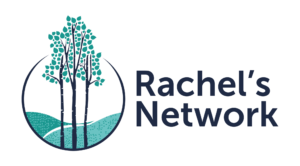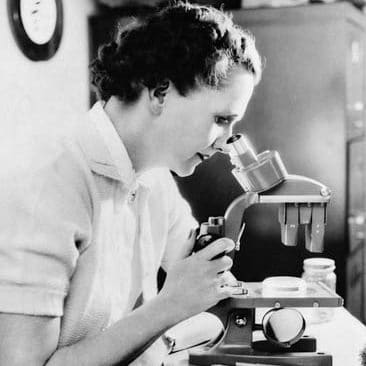About Us
About Us
Named in honor of Rachel Carson, we are a community of women committed to a safer, healthier, and more just world for all.
Our funder members have given over $2.8 million collectively through the Rachel’s Network Catalyst Award and co-funding projects, in addition to millions in individual giving on issues like regenerative agriculture, environmental health and justice, conservation, and climate change.
Collectively, the network is a dynamic community of sounding boards, allies, and friends who work together for a better world.
For more on our programs, events, and funding, please read our most recent Annual Report, our blog, or our Impact page.
Our Leadership
Staff
Jamie Boese, program director, designs and implements our comprehensive events calendar. Prior to joining Rachel’s Network, she worked in national arts administration, focusing on programs, events, strategic planning, and board and staff development.
Shreya Durvasula, Catalyst Award director, fosters collective and individual impact among Catalyst awardees and members and creates grant programs grounded in justice and equity. She previously worked as Science Network manager at the Union of Concerned Scientists.
Erica Flock, communications and advocacy director, oversees the Network’s website, print publications, and social media. She also manages the Network’s 501(c)(4) Rachel’s Action Network. She previously worked in communications and marketing for EarthShare, the National Wildlife Federation, and Kumarian Press.
Hannan Sheikh, finance & membership director, oversees the processes and systems related to finances, databases, and membership. She received an international MBA with a concentration in sustainability and environmental compliance and a BS in environmental science and policy from the University of Maryland.
Fern Shepard, president, has over 30 years of experience in the environmental community, first as a staff attorney with Earthjustice and later as a senior officer managing international lands conservation programs at The Pew Charitable Trusts. She has worked on issues ranging from securing threatened and endangered species habitat to protecting children and at-risk populations from lead contamination and dangerous pesticides. Fern serves on Earthjustice’s Board of Trustees and is a mother of three.
Sarah Walker, membership and development director, cultivates future members and supports current members. A passionate conservationist, she has a MA in biology and previously worked in communications and development at the Wildlife Conservation Society and Oyster Recovery Partnership. Most recently, Sarah served as a director of strategy and development at a consulting firm supporting nonprofit fundraising efforts.
Board of Directors
- Kef Kasdin, Chair
- Molly Ross, Vice Chair
- Fa Liddell, Secretary
- Martha Davis
- Josie Gabel
- Barbara Gonzalez-McIntosh
- Tacy Hahn
- Lisa Holmes
- Ann Hunter-Welborn
- Alice Liddell
- Elena Marszalek
- Janet Montgomery
- Kimberley Milligan
- Rosamond Pope-Meyer
Advisors
- Maite Arce, President & CEO, Hispanic Access Foundation
- Abigail Dillen, President, Earthjustice
- Angelou Ezeilo, CEO and Founder, Greening Youth Foundation
- Jennifer Dianto Kemmerly, Vice President, Global Ocean Conservation, Monterey Bay Aquarium
- Ebony Twilley Martin, Executive Director, Greenpeace USA
- Theresa Pierno, President & CEO, National Parks Conservation Association
- Kathleen Rogers, President, EARTHDAY.ORG
- Janis Searles Jones, CEO, Ocean Conservancy
- Dilly Severin, Executive Director, Universal Access Project
- Whitney Tome, Principal, Raben Group
Our Commitment to Racial Justice
Twenty years ago, our network of women funders came together to advance women’s leadership in the environmental and grantmaking communities. We knew that confronting gender inequality was necessary to achieving a healthy and thriving world and that not enough people were making the connection between women’s empowerment and environmental progress.
Racism too is preventing environmental progress in profound, multifaceted ways. Not only do people of color* face disproportionate environmental harms, but also professional and other barriers when they seek change. As a group of predominately white women of privilege who have benefited from systems that were designed to exclude, we must work to address these inequities.
The fields in which we operate—philanthropy, environmentalism, and even feminism—have been shaped by our country’s history of systemic racism. Women of color in particular face discrimination and harm based on both race and gender in ways that are crucial for us to address as an organization that cares about women.
We join with other grantmaking and environmental organizations in pledging to undo exclusionary practices, stand allied against racist violence, and foster justice and healing. An essential component of this commitment includes increasing our understanding, both individually and organizationally, of how history advantages and limits us.
Our path to allyship is a journey and we are listening to and learning from the leaders in our community who have already done significant work. The work below is a map, not the work itself, and we intend to update this list as we learn. Many of these commitments are already in progress.
Strengthening Diversity, Equity, Inclusion, and Justice (JEDI) Principles in Our Organization
Our staff, board of directors, and JEDI committee will set policies, track progress, and increase JEDI capacity at all levels of our organization.
Educating Our Community
We will provide resources, trainings, and programs for our members and community to engage in anti-racist philanthropic efforts and grow as allies.
Funding and Supporting More Women of Color
We will prioritize and expand our funding to women of color and their organizations in our collective grantmaking. We will ensure they have power in decisions over the allocation of these funds and are compensated for their participation. We will seek out women of color-led businesses when choosing vendors and event venues.
Championing More Women of Color
We will use our platforms to elevate the public profile of women of color leaders in our community, and equitably and transparently compensate these women when they engage or share their expertise with our network.
Creating and Maintaining an Inclusive Culture
We will adapt our organization, programs, and services to become a place where women of color are welcomed and feel supported.
* We use this term not to suggest that all people of color are the same, or that the term is accepted and used by all. We recognize and honor varied lived experiences and will not use this term to refer to specific ethnic groups or identities. In some cases, we will use the term BIPOC to acknowledge the unique ways Indigenous people and Black African-Americans have been shaped by the effects of white supremacy, slavery, and colonization.
Land Acknowledgement
Our headquarters in Washington, DC is located on the ancestral lands of the Nacotchtank (also documented as the Anacostans), and neighbors the ancestral lands of the Piscataway people who have resided here for over 10,000 years. The confluence of the Anacostia and Potomac Rivers made the area a major crossroads and trading center for the original people. Starting in the early 1600s, European settler-colonialists in this area introduced diseases, encroachment, forced removal, and erasure of cultural practices. Today, the roughly 4,000 indigenous people who reside in the Washington, DC area work for recognition and sovereignty of their descendant communities. To learn more, visit the Piscataway Conoy Tribe and learn about Indigenous lands in your area at native-land.ca.
Our Office
Rachel’s Network headquarters are located in the World Wildlife Fund building in Washington, DC. The building boasts a LEED Platinum certification—the US Green Building Council’s highest certification for environmental health and energy efficiency—and the third-largest green roof in DC. The building features MERV 13 HVAC air filters for better indoor air quality and energy efficiency, motion-sensor lighting, water-saving faucets and toilets, secure bike parking and ev charging stations, green cleaning products, and more. The building also diverts over 90% of paper, glass, plastics, cardboard, metals, batteries and fluorescent light bulbs from landfills. Most of the furniture in the Rachel’s Network suite was purchased secondhand. An all-women team found and designed the space (real estate agent Elizabeth Birch, architect Emily Macht, interior designer Julia Rubert, and muralist/artist Denise Lee).
Our Logo

One aspen tree is actually only a small part of a larger organism. A stand or group of aspen trees is considered a singular organism with the main life force underground in the extensive root system.
Just as Rachel’s Network is comprised of individuals who are connected by a deep commitment to environmental protection, each aspen tree is connected underground to those around it. The aspen has one of the broadest ranges of any tree species in the world, reflecting its resilience and adaptability.
Research is uncovering the complex ways that trees communicate and share resources with one another and the broader ecosystem. Perhaps no tree is better known for this than the aspen, which neatly parallels the ways in which our members share information and collaborate. The choice of three aspen trees symbolizes our three-pronged mission of environmental advocacy, philanthropy, and women’s leadership. The limbs and leaves of all three trees are intertwined, symbolizing the interconnections between these three prongs.

About Rachel Carson
Rachel Carson was a scientist, ecologist, and writer who courageously advocated for policies that protected human health and the environment. Her research and writing spurred the creation of the Environmental Protection Agency and the modern environmental movement. Buoyed by her vision and audacity, we continue her legacy of fighting for the safety of our communities and our planet.

